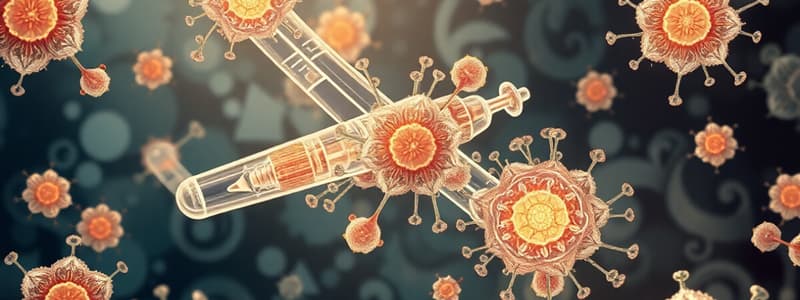Podcast
Questions and Answers
What is the primary role of yeast in the baking industry?
What is the primary role of yeast in the baking industry?
- To generate carbon dioxide (correct)
- To enhance the flavor of bread
- To produce antibiotics
- To kill disease-causing bacteria
Which of the following is NOT a source of antibiotics?
Which of the following is NOT a source of antibiotics?
- Plants (correct)
- Fungi
- Microorganisms
- Bacteria
How did Alexander Fleming discover penicillin?
How did Alexander Fleming discover penicillin?
- By testing yeast in bacterial cultures
- By mixing antibiotics with fruit juice
- Through observing mold that killed bacteria (correct)
- From a failed experiment with grains
Which antibiotic is NOT mentioned as being produced from bacteria?
Which antibiotic is NOT mentioned as being produced from bacteria?
In fermentation, what type of sugars does yeast primarily grow on for alcohol production?
In fermentation, what type of sugars does yeast primarily grow on for alcohol production?
What characteristic of antibiotics allows them to stop disease-causing microorganisms?
What characteristic of antibiotics allows them to stop disease-causing microorganisms?
What is the end result of using microorganisms in the production of vinegar?
What is the end result of using microorganisms in the production of vinegar?
What is a common medicinal use of microorganisms besides producing antibiotics?
What is a common medicinal use of microorganisms besides producing antibiotics?
What is the primary function of antibiotics?
What is the primary function of antibiotics?
Which of the following diseases can be prevented by vaccination?
Which of the following diseases can be prevented by vaccination?
What can happen if antibiotics are taken when not needed?
What can happen if antibiotics are taken when not needed?
Who discovered the vaccine for smallpox?
Who discovered the vaccine for smallpox?
Why is it important to complete the antibiotic course prescribed by a doctor?
Why is it important to complete the antibiotic course prescribed by a doctor?
How do vaccines protect the body against diseases?
How do vaccines protect the body against diseases?
What term is used to describe microorganisms that cause diseases in humans, plants, and animals?
What term is used to describe microorganisms that cause diseases in humans, plants, and animals?
What is the consequence of taking incorrect doses of antibiotics?
What is the consequence of taking incorrect doses of antibiotics?
How do pathogens commonly enter the human body?
How do pathogens commonly enter the human body?
What is the purpose of adding antibiotics to livestock feed?
What is the purpose of adding antibiotics to livestock feed?
Which of the following is a carrier of the malaria parasite?
Which of the following is a carrier of the malaria parasite?
What is a recommended practice to prevent the transmission of pathogens from contaminated food?
What is a recommended practice to prevent the transmission of pathogens from contaminated food?
Which type of diseases are spread from an infected person to a healthy person?
Which type of diseases are spread from an infected person to a healthy person?
What is the role of a housefly in the transmission of diseases?
What is the role of a housefly in the transmission of diseases?
Which of the following diseases is specifically transmitted through mosquito bites?
Which of the following diseases is specifically transmitted through mosquito bites?
Why are infectious droplets significant in the transmission of illness?
Why are infectious droplets significant in the transmission of illness?
What is the primary reason for food spoiling, as mentioned in the content?
What is the primary reason for food spoiling, as mentioned in the content?
Which method is commonly used to preserve food at low temperatures?
Which method is commonly used to preserve food at low temperatures?
What are sodium benzoate and sodium metabisulphite used for?
What are sodium benzoate and sodium metabisulphite used for?
How can the milk in packets remain unspoiled?
How can the milk in packets remain unspoiled?
What happens to bread when left in moist conditions?
What happens to bread when left in moist conditions?
What is a chemical method of preserving food?
What is a chemical method of preserving food?
Why does spoiled food emit a bad smell?
Why does spoiled food emit a bad smell?
What is the effect of adding acid preservatives to food?
What is the effect of adding acid preservatives to food?
What type of organisms are considered microbes despite being different from bacteria, fungi, protozoa, and algae?
What type of organisms are considered microbes despite being different from bacteria, fungi, protozoa, and algae?
Which of the following microorganisms are known to cause serious diseases?
Which of the following microorganisms are known to cause serious diseases?
Which microorganisms are known for their role in decomposing organic waste?
Which microorganisms are known for their role in decomposing organic waste?
Which process is directly associated with certain bacteria fixing nitrogen into the soil?
Which process is directly associated with certain bacteria fixing nitrogen into the soil?
What role do some microorganisms play in the environment that assists with soil fertility?
What role do some microorganisms play in the environment that assists with soil fertility?
Which of the following environments can microorganisms thrive in?
Which of the following environments can microorganisms thrive in?
What is a common use of certain microorganisms in commercial production?
What is a common use of certain microorganisms in commercial production?
Which microorganisms can lead to food poisoning by growing on food?
Which microorganisms can lead to food poisoning by growing on food?
Flashcards are hidden until you start studying
Study Notes
Medicinal Use of Microorganisms
- Antibiotics are medicines derived from microorganisms that kill or stop the growth of disease-causing microorganisms.
- Examples of antibiotics include penicillin, streptomycin, tetracycline and erythromycin.
- Alexander Fleming discovered penicillin in 1929, observing that a mold prevented the growth of bacteria in a culture plate.
- Antibiotics can be used to cure a variety of diseases and are even mixed with animal feed to prevent microbial infections.
- It is crucial to consult a doctor for antibiotic prescriptions and complete the prescribed course as incomplete or unnecessary use can reduce its future effectiveness and harm beneficial bacteria in the body.
- Antibiotics are not effective against cold and flu, which are caused by viruses.
Vaccines
- Vaccines are injections that contain weakened or inactive versions of disease-causing microbes, stimulating the body to produce antibodies against the disease.
- The body remembers how to fight these microbes if they enter the body again, providing immunity.
- Vaccines are available for diseases like cholera, tuberculosis, smallpox, hepatitis, and polio.
- Edward Jenner discovered the vaccine for smallpox in 1798.
- A worldwide campaign against smallpox has successfully led to its eradication in most parts of the world.
Harmful Microorganisms
- Microorganisms like bacteria, fungi, and some viruses can cause diseases called microbial diseases in humans, plants and animals.
- These disease-causing microorganisms are called pathogens and can be transmitted through air, water, food, physical contact, or animal carriers.
- Examples of communicable diseases include cholera, common cold, chicken pox, and tuberculosis.
- Food poisoning can occur due to the consumption of food contaminated with microbes that produce toxic substances.
- Carriers of disease-causing microbes include houseflies, which can spread pathogens from garbage and animal excreta to uncovered food.
- The female Anopheles mosquito carries the Plasmodium parasite responsible for malaria, and the female Aedes mosquito carries the dengue virus.
Food Preservation
- Microorganisms can spoil food by decomposing it, causing a bad smell, taste, and change in color.
- Common methods of food preservation at home include:
- Salting and Drying: These methods remove moisture, inhibiting microbial growth.
- Refrigeration: Low temperatures slow down microbial growth.
- Chemical preservatives: These chemicals like salt, edible oils, sodium benzoate, and sodium metabisulphite hinder microbial activity.
- Pasteurization is a process that heats milk to a specific temperature to kill harmful microbes, making it safe to consume without boiling.
- The use of preservatives in jams, squashes, and pickles helps to prevent spoilage.
Studying That Suits You
Use AI to generate personalized quizzes and flashcards to suit your learning preferences.





